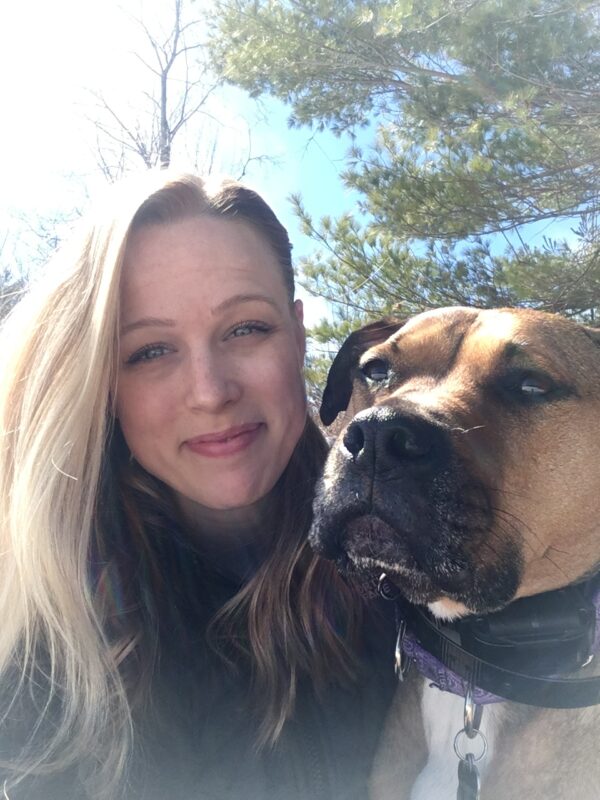Caitlin Herr: Saving and delivering lives
Growing up, Caitlin Herr looked at the amount of time her parents spent volunteering for rescue services and felt absolutely no desire to enter the field, but one incident led to a change of heart.
Herr’s mother was driving her to school when she had to change direction because there was an explosion at a local wood mill. She took two patients to the hospital and asked Herr, then a teenager, to put pressure on an arterial bleed.
“I thought it was the coolest thing I’d ever done,” Herr said, “and I was hooked.”
This year marks Herr’s 10th anniversary with the Charlotte Volunteer Fire and Rescue Service. She has spent the last three of those years as Battalion Chief of the rescue squad.

Charlotte Volunteer Fire and Rescue Battalion Chief Caitlin Herr enjoys spending her free time with her rescue dog Luna.
Herr started in the field with the Underhill Jericho Fire Department where her mother and stepfather served, but her true interest was in rescue services which, at the time, didn’t accept teenagers.
“Because of my constant badgering, Essex came up with a junior program,” she recalled, “and I was able to leave firefighting for health care.”
Herr started working in Charlotte in 2013 on a per diem basis but became full-time shortly thereafter.
In 2020, she was appointed battalion chief. There are currently 26 people on the rescue side of the organization including volunteers, per diem and full-time workers.
Herr noted that people don’t need to have a lot of medical training to volunteer. “We educate you from the ground up,” she said.
Herr said one requirement for being a member of the rescue squad is the ability to multitask. Another key is having situational awareness. Some basic tasks performed by the group are bandaging and providing CPR. Advanced EMTs can also insert IVs, provide appropriate medication and perform EKGs in the field. Those who, like Herr, have achieved paramedic certification can interpret the EKGs and treat heart conditions like atrial fibrillation and supraventricular tachycardia with medication or — as a last resort — electricity.
Herr notes that one important aspect of having paramedics is the ability to provide pain medication. A hypothetical patient with a fractured leg on top of Mt. Philo would be in significantly more pain if there wasn’t a paramedic in the ambulance.
“Probably one of the most important things we do is pain control for people with injuries,” Herr said. “That can make all the difference.”
Sometimes rescue work can be depressing, so Herr relishes the opportunity to bring new lives into the world. The crew has delivered four babies in the last five years, usually in the new parents’ home. Often they are called to the homes of prospective parents who seem most prepared. They have birth plans and go-bags, but the newborns have other plans.
One downside to the work is that rescues don’t always fall within the parameters of a 12-hour shift. “You never plan anything for the end of a shift,” Herr said. “If you’re supposed to finish at 7 p.m., you know better than to make dinner reservations for 7:30.”
Herr said that within the Charlotte Fire and Rescue there is no sexism but sometimes people from other organizations will ask to speak to her battalion chief, not recognizing that’s her. On some calls, even if she is the first one in the door, people will direct their questions to one of her male colleagues.
Recently, Herr went on a call with a female colleague. The wife of the male patient fretted that two women wouldn’t be able to lift him. Herr’s colleague is a powerlifter, who probably could have carried the man by herself.
“My mother made me feel more than adequate for this work,” Herr said. “She had to go through her share of trials, and I’ve had some, but I feel like I’ve had a lot less thanks to her, and hopefully, the next generation will have even less.”
Herr hopes more people will volunteer and possibly become full-time members of the service. “It’s rewarding, especially when patients thank you, and there’s a real adrenaline rush,” she said. “If you can lift over 50 pounds and want to learn about medicine, it’s a great place to be.”
Herr loves working in Charlotte because it’s an active community and she gets to meet a diverse group of people.
“I feel like this is what I was meant to do,” she said. “Some days it can be quite stressful, but I haven’t come up with anything that beats what I do.”
